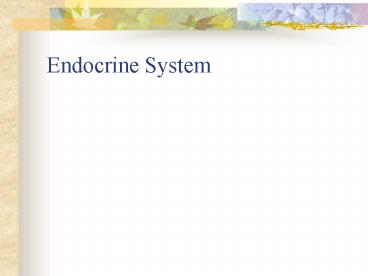Endocrine System PowerPoint PPT Presentation
1 / 27
Title: Endocrine System
1
Endocrine System
2
I. Nervous vs. Endocrine system
Electrical Neurotransmitter
Hormone
Fast (seconds)
Slower
Short
Longer
3
II. Endocrine System
A. Hormones two classes
- Steroids gonads and adrenal cortex
- Protein based (amines, peptide, proteins)
B. Control of Hormonal secretions
1. Humoral (change in plasma
concentration levels)
- glucose changes monitored by insulin and
glucagon
2. Nervous system control
- Sympathetic NS signals adrenal medulla to
secrete epinephrine and norepinephrine
4
(No Transcript)
5
3. Hormonal stimulation
- Hormone from one endocrine gland controls the
release of a hormone from another gland
- Pituitary gland
- Ex. Hypothalamus -gt Pituitary-gtTSH -gtThyroid
C. Hormone interaction with target cell
1. Steroid intracellular receptors
- diffuse through membrane
- binds with intracellular receptor
- binds to DNA to promote RNA synth
- protein synthesis
6
(No Transcript)
7
2. Protein extracellular receptors
a.) control channels
allow movement of ions
b.) synthesize 2nd messenger
activate enzyme
c.) activate G protein
control channels activate
enzyme (2nd mess)
d.) phosphorylate receptor
8
(No Transcript)
9
(No Transcript)
10
(No Transcript)
11
(No Transcript)
12
(No Transcript)
13
Endocrine Glands
14
I. Pituitary Gland
Anterior and Posterior lobes
A. Posterior - neurohormones
1. ADH/Vasopressin
- Reduces the volume of urine
- Trigger increase in solute conc of blood
decrease in blood pressure
(vasopressin)
- Target and effect kidneys reabsorb water
arterioles
increase blood pressure
- Underproduction diabetes insipidus
15
(No Transcript)
16
(No Transcript)
17
2. Oxytocin
- contracts smooth muscle of uterus/milk ejection
- Trigger stretch of the uterus
Nursing
- Target and effect smooth muscles of the uterus
secretory cells of mammary glands
B. Anterior Pituitary
1. Secretion
- Releasing Hormone from Hypothalamus
release of Ant. Pit hormones
18
2. TSH (thyroid stimulating hormone)
- Trigger Stress or exposure to cold
- Target Thyroid
- Negative feedback
3. ACTH (Adrenocorticotropic)
- Trigger Stress or low blood glucose level
- Target Adrenal cortex
4. LH and FSH (Luteinizing/Follicle-sti
mulating)
- Trigger Cyclic
- Targets Gonads
19
5. Prolactin
- stimulates development of mammary glands and
milk production
- Trigger Childbirth
- Target and effect Mammary glands -gt milk
Enhances release of progesterone from ovaries
6. Growth hormone (GH)
- stimulates growth in tissues/regulates
metabolism
- Trigger stress, low blood glucose
- Target and effect most tissues
increase protein synth./breaks down
lipids
20
II. Thyroid gland
A. T4/T3
- Trigger
Stress/cold Release of TSH
Requires iodine
- Target many tissues
- Effect Increase metabolism
protein synthesis
increase
production of ATP
B. Underproduction
C. Overproduction
21
(No Transcript)
22
D. Calcitonin
Parafollicular cells of Thyroid
- Trigger increase calcium
- Target Bone
decrease break down of
bone (reduce Calcium)
III. Parathyroid gland
A. PTH
- Trigger decrease calcium
- Target Bone increase bone break down
Kidneys
calcium absorp
Intestine
calcium absorp
23
(No Transcript)
24
(No Transcript)
25
IV. Pancreas
A. Hormones
1. Insulin
- Trigger high glucose levels
food intake
(ANS)
gastrointestinal hormones
- Target Liver, adipose, muscles
- Effect store glucose in tissues (glycogen)
convert amino
acids to proteins
2. Glucagon
- Trigger low glucose
Sympathetic
NS
26
(No Transcript)
27
- Target Liver (mostly), adipose, skeletal
muscle
Breaks glycogen into
glucose

